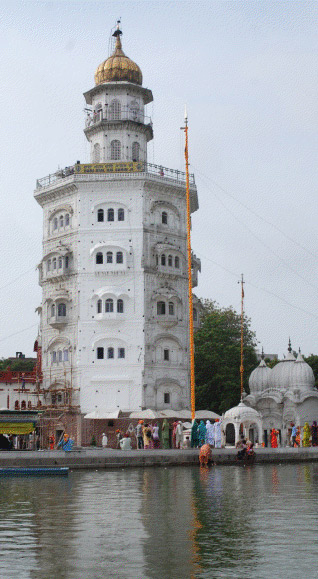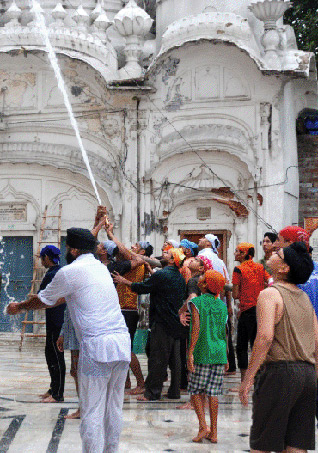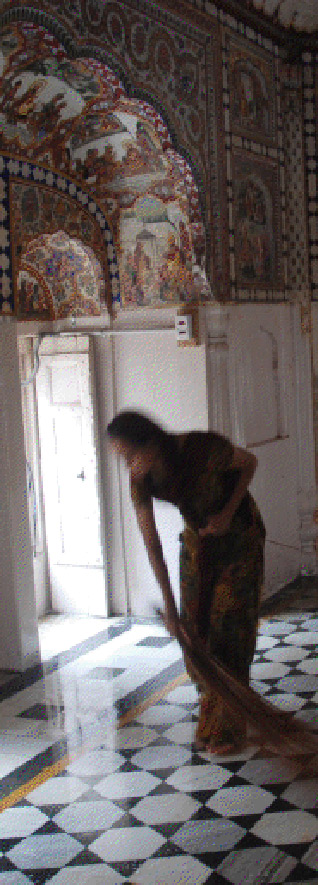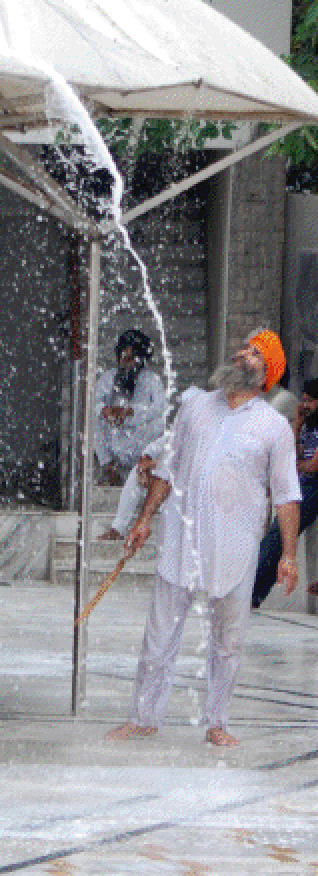Travel
When The Rains Came:
Kar Seva at Baba Atal
Text: GURNEK SINGH, et al. Photography: SANDEEP SINGH
There is an old tradition attached to Gurdwara Baba Atal Rai - popularly known as Baba Atal - a 9-storey octagonal marble edifice located on the periphery of the Darbar Sahib complex in Amritsar.
Whenever the city suffers from a long dry spell in its hot summers, the sangat does kar seva at this gurdwara by washing the whole tower, all nine floors of it, as well as taking a dip in the sarovar attached to the property. Tradition has it that the devotion and seva invariably result in relief brought by rain showers.
One such occasion was on Sunday, July 8, 2012 and photographer Sandeep Singh was at hand to capture some of the key moments during the seva.
Baba Atal Rai (1619-1628), in whose honour this gurdwara stands, was a son of the Sixth Master, Guru Hargobind (1595-1644), and was born to Mata Nanaki at Amritsar on 23 October, 1619.
Atal Rai died at the tender age of nine years. The circumstances of his death, as narrated in Gurbilas Chhevi Patshahi, were most extraordinary.
Atal Rai had a playmate, Mohan, who was the son of a local businessman, Suini Shah. One day, as they played with ball and sticks far into the evening, the forfeit was upon Mohan. During the night Mohan was bitten by a snake and he died. When he did not turn up for play the following morning, Atal Rai went to his home to find the members of his family wailing and lamenting.
Atal Rai innocently walked up to where Mohan was lying under a sheet spread over him, and spoke: "Why do you sleep so soundly, dear friend? It is not time for sleep: and, remember, you owe us the forfeit."
Saying these words, he touched the boy with his stick. The boy stood up.
The story that Atal Rai had raised a dead body swept through the town. Guru Hargobind was not pleased when he heard this. "karamat qahar hai - Miracle-making is violence! None should attempt to intervene in the Will of the Lord," he told his son.
Atal Rai took the admonition to heart. Making a respectful bow, he quietly retired from the Guru's presence. After ablutions in the sarovar of Harmandar Sahib and having recited the Japji on the bank of Kaulsar, he lay down on the ground with the stick underneath his head and went to his eternal repose.
This happened on 13 September, 1628.
[Sandeep Singh has two passions, literature and photography. He pursues the latter by concentrating on people and monuments. His work has been acclaimed through several exhibitions.]
Courtesy: The Encyclopaedia of Sikhism, (Editor, Dr Harbans Singh). Edited for sikhchic.com.
July 23, 2012
Conversation about this article
1: Ajitpal Singh (Vienna, VA, USA), July 23, 2012, 4:34 PM.
I am sorry to say that this article reminds me of a similar article published on sikhchic.com just a few days ago. The said article had mocked the practice of marrying some toads (as per some Hindu custom) to appease the rain gods, in different parts of India. Although a lot more dignified, the practice mentioned in this article reeks of the same superstitious/ritualistic tendencies that we Sikhs shouldn't espouse. Having faith in the Almighty is one thing, following a ritual mindlessly is another. And the irony is, we are trying to influence an act of God (or nature) using a historical figure who gave up his life for precisely doing the same!
2: Pritam Kaur (Amritsar, Punjab), July 24, 2012, 8:11 AM.
Here's another way of looking at it: it's a brilliant way to get the sangat motivated over cleaning up the gurdwara which, because of its design, collects a lot of dust during the dry months of May and June. The rains have nothing to do with the seva: the monsoons always come ... in July. They have never failed, seva or no seva. A day or two late, a day or two early, but nature never disappoints. So, many are the ways to get us human beings to do things we ought to do on our own volition, but don't get around to doing them. We are like kids in many ways and need to be coaxed in some form or the other. But please don't tell the Baba Atal sangat what I have told you ... otherwise, the magic will be lost. It'll be like telling a child that there is no chhoo-chhoo train, that it's only a spoon.






